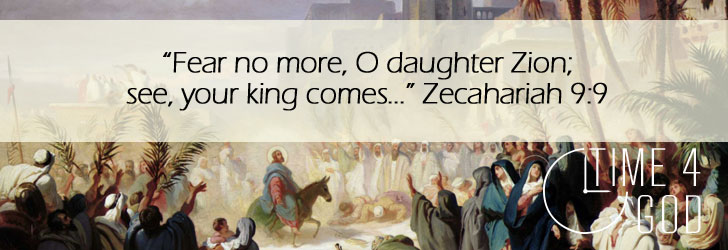Palm Sunday: The Beginning of Holy Week
Jesus entered Jerusalem riding on the back of a donkey colt, draped with the cloaks of some of his disciples. The people of Jerusalem greeted him with shouts of joy.

Jesus entered Jerusalem riding on the back of a donkey colt, draped with the cloaks of some of his disciples. The people of Jerusalem greeted him with shouts of joy. All four gospels have this account. In John’s gospel he writes: ʺJesus found an ass and sat upon it; as is written: ‘Fear no more, O daughter Zion; see, your king comes, seated on an ass’s colt.ʺ (Zecahariah 9:9)
There is a powerful significance to Jesus entering Jerusalem this way. First, he is the king, but not in the sense that the people of Jerusalem thought of it on that day. The people of Jerusalem great him in this way, but most will soon abandon him when he starts his preaching ministry there. Another significance is that, though he is truly a king, he enters Jerusalem on the back of an ass’s colt, not a war horse. The young donkey is a sign of the peace that only God can bring.
[content-ad]
It is soon after this that Jesus drives the money changers out of the Temple. (Luke 19:45-8) He upsets the ʺapplecartʺ in other ways too. His preaching starts to sound more like prophecies concerning what will soon be his own death at the hands of many of those that only recently greeted him as a hero.
In Matthew’s gospel we see him telling the parable of the tennants who leased a well-tilled and planted vineyard from the landowner (God), and when the landowner sends his servants (the prophets) to obtain his produce, they seize them, beat one, stone another, and kill the third. Finally he sends his son (Jesus) whom they kill, foolishly thinking that they will acquire the inheritance themselves. Jesus tells his listerners: ʺDid you never read in the scriptures: ‘The stone that the builders rejected has become the cornerstone; by the Lord has this been done and it is wonderful in our eyes.’ Therefore, I say to you the kingdom of God will be taken away from you and given to a people that will produce fruit. The one who falls on this stone will be dashed to pieces; and it will crush anyone on whom it falls.’ʺ (Matthew 21:42-45)
In Mark’s account, immediately following Jesus’ entry into Jerusalem, we see him challenged by the political cynicism of the Pharisees and the Herodians. They ask him, ʺIs it lawful to pay the census tax to Caesar or not? Should we pay or should we not pay?ʺ And Jesus, knowing their motivations and their hypocracy answers them with the perfect logic of truth, ʺRepay to Caesar what belongs to Caesar and to God what belongs to God.ʺ Mark tells us, ʺThey were utterly amazed at him.ʺ (Mark 12:13-17)
To make a long story short, the celebrations in Jerusalem that we remember in our observance of Palm Sunday quickly dissapate with Jesus’ challenging messages, which are directed not only to the Pharisees, but to the common folk (us) who wanted the kingdom to come easily and the Messiah to be their political and military liberator from their Roman overlords. Jesus was, is, and always will be the king that they (and we) needed. He is the one, true liberator. But his liberation is of a far more important kind than mere political liberation. We live in the freest country in the world, but we are not free in the way that Jesus liberates. The messages that Jesus gives after his entry into Jerusalem may be even more challenging to us in our own time. We have come to think of freedom in rather distorted ways and have abused its gift by disconnecting it from any sense of responsibility to others besides ourselves. Our truest liberation is in turning away from our sins of pride, greed, anger, jealousy, lust, gluttony, and sloth, with the help of God’s grace. It is in finally seeing, and in living out the real meaning and purpose of this life, which is in our free, willing and loving service of others, especially those who are poor, or disenfranchised in any way, that we find real freedom.
If Jesus came among us today, would most people even care? Would he be met with an even greater cynicism, a more arrogant hypocracy, and more bitter opposition today than he was 2,000 years ago in Jerusalem? As Christians, no matter how deeply committed we are, we still need to be open to the challenges that Jesus gives us each day. We are not finished yet. Christ has died, and he has risen, and he will come again. We have been forgiven, the gates of paradise have been opened to us again, but we are not there yet. We must humbly accept the entrance of Jesus into the ʺJerusalemʺ of our own hearts every day. And we must remain true to him, even when he challenges us to grow beyond our supposed, or imagined limits. He does not ask us to do anything he would not do. He knows us better than we know ourselves. Let us listen, then, more humbly, more deeply, and more willingly to his call every day of our lives. Amen.
SKM: below-content placeholderWhizzco for FHB

